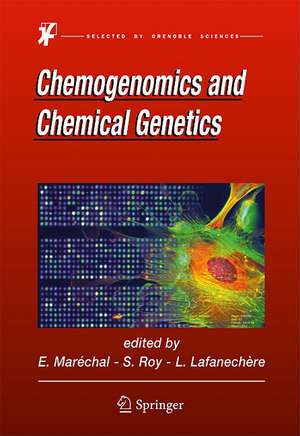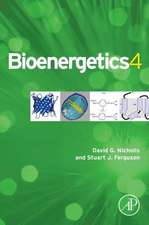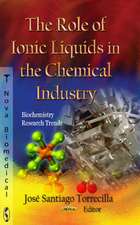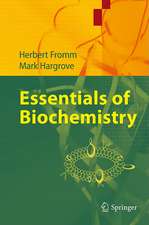Chemogenomics and Chemical Genetics: A User's Introduction for Biologists, Chemists and Informaticians
Editat de ERIC MARECHAL, Sylvaine Roy, Laurence Lafanechèreen Limba Engleză Hardback – 17 iun 2011
This book is dedicated to biologists, chemists and computer scientist beginners. It is organized in brief, illustrated chapters with practical examples. Clear definitions of biological, chemical and IT concepts are given in a glossary section to help readers who are not familiar with one of these disciplines. "Chemogenomics and Chemical Genetics" should therefore be helpful for students (from Bachelor's degree level), technological platform engineers, and researchers in biology, chemistry, bioinformatics, cheminformatics, both in biotech and academic laboratories.
| Toate formatele și edițiile | Preț | Express |
|---|---|---|
| Paperback (1) | 642.51 lei 43-57 zile | |
| Springer Berlin, Heidelberg – 23 aug 2016 | 642.51 lei 43-57 zile | |
| Hardback (1) | 647.40 lei 22-36 zile | |
| Springer Berlin, Heidelberg – 17 iun 2011 | 647.40 lei 22-36 zile |
Preț: 647.40 lei
Preț vechi: 761.65 lei
-15% Nou
Puncte Express: 971
Preț estimativ în valută:
123.88€ • 129.69$ • 102.50£
123.88€ • 129.69$ • 102.50£
Carte disponibilă
Livrare economică 17-31 martie
Preluare comenzi: 021 569.72.76
Specificații
ISBN-13: 9783642196140
ISBN-10: 3642196144
Pagini: 270
Ilustrații: XI, 256 p.
Dimensiuni: 165 x 251 x 20 mm
Greutate: 0.61 kg
Ediția:2011
Editura: Springer Berlin, Heidelberg
Colecția Springer
Locul publicării:Berlin, Heidelberg, Germany
ISBN-10: 3642196144
Pagini: 270
Ilustrații: XI, 256 p.
Dimensiuni: 165 x 251 x 20 mm
Greutate: 0.61 kg
Ediția:2011
Editura: Springer Berlin, Heidelberg
Colecția Springer
Locul publicării:Berlin, Heidelberg, Germany
Public țintă
ResearchCuprins
The pharmacological screening process:the small molecule, the biological target, the robot, the signal and the information.- Collections of molecules for screening: example of the French National Chemical Library.- The miniaturised biological assay: constraints and limitations.- The signal: statistical aspects, standardisation, elementary analysis.- Measuring bioactivity: Ki, IC50 and EC50.- Modelling the pharmacological screening:controlling the processes and the chemical, biological and experimental information.- Quality procedures in automated screening.- Phenotypic screening of cells and the strategies for direct chemical genetics.- High information content screens for forward (phenotypic screening of organisms) and reverse (structural screening by NMR) chemical genetics.- Some principles of Diversity-Oriented Synthesis.- Molecular descriptors and similarity indices.- Lipophilicity of molecules: a predominant descriptor for QSAR.- The annotation and classification of chemical space in chemogenomics.- The annotation and classification of biological space in chemogenomics.- Machine learning and screening data.- Virtual screening by molecular docking.- Biodiversity as a source of small molecules for pharmacological screening: libraries of plant extracts.
Textul de pe ultima copertă
Biological and chemical sciences have undergone an unprecedented transformation, reflected by the huge use of parallel and automated technologies in key fields such as genome sequencing, DNA chips, nanoscale functional biology or combinatorial chemistry. It is now possible to generate and store from tens of thousands to millions of new small molecules, based on enhanced chemical synthesis strategies. Automated screening of small molecules is one of the technologies that has revolutionized biology, first developed for the pharmaceutical industry and recently introduced in academic laboratories. High-throughput and high-content screening allow the identification of bioactive compounds in collections of molecules (chemical libraries), being effective on biological targets defined at various organisational scales, from proteins to cells to complete organisms. These bioactive molecules can be therapeutic drug candidates, molecules for biotech, diagnostic or agronomic applications, or tools for basic research. Handling a large number of biological (genomic and post-genomic), chemical and experimental information, screening approaches cannot be envisaged without any electronic storage and mathematical treatment of the data. “Chemogenomics and Chemical Genetics" is an introductory manual presenting methods and concepts making up the basis for this recent discipline.
This book is dedicated to biologists, chemists and computer scientist beginners. It is organized in brief, illustrated chapters with practical examples. Clear definitions of billogical, chemical and IT concepts are given in a glossary section to help readers who are not familiar with one of these disciplines. "Chemogenomics and Chemical Genetics" should therefore be helpful for students (from Bachelor's degree level), technological platform engineers, and researchers in biology, chemistry, bioinformatics, cheminformatics, both in biotech and academic laboratories.
This book is dedicated to biologists, chemists and computer scientist beginners. It is organized in brief, illustrated chapters with practical examples. Clear definitions of billogical, chemical and IT concepts are given in a glossary section to help readers who are not familiar with one of these disciplines. "Chemogenomics and Chemical Genetics" should therefore be helpful for students (from Bachelor's degree level), technological platform engineers, and researchers in biology, chemistry, bioinformatics, cheminformatics, both in biotech and academic laboratories.
Caracteristici
Conceived for beginners Not only for medicinal chemists, but any biologist, chemist, mathematician or IT scientist interested in that field Written by experts from both the academic (University) and private (Pharma companies) sectors Shows more applications than just drug discovery Includes supplementary material: sn.pub/extras






